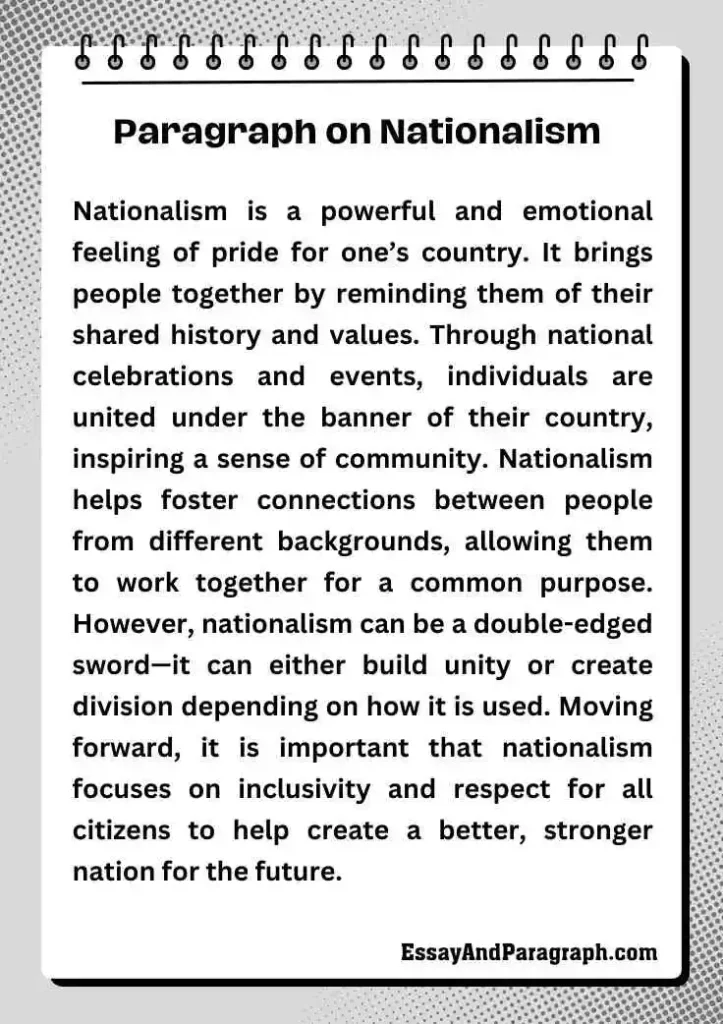In this article, we will learn how to write paragraphs on nationalism in different lengths (100, 150, 200, 250, 300 words). Nationalism is a strong feeling of pride and loyalty to one’s country. It shapes how we see ourselves and our relationship with others. Whether it’s the celebration of a nation’s independence or the shared history of its people, nationalism can bring people together, but it can also cause divisions. In this article, we’ll explore the emotional responses, activities, and outcomes tied to nationalism. Let’s dive in and learn how to express these ideas clearly and simply.
Paragraph on Nationalism (100 Words)
Nationalism is the feeling of pride you have for your country. I remember feeling so proud during our Independence Day celebrations. We sang our national anthem, and I saw my family and friends smiling and waving flags. It made me feel connected to everyone around me. That day, I realized that nationalism helps us appreciate our country and its history. It brings people together for a common cause. In the future, I believe nationalism will continue to remind us of our shared values and help build unity among people, even if we have different backgrounds.

Paragraph on Nationalism (150 Words)
Nationalism is the strong love and pride people feel for their country. When I saw the flag raised during the Independence Day ceremony, I felt a rush of excitement and joy. It wasn’t just about the flag; it was about remembering all the people who worked hard for our freedom. My family and friends gathered together to celebrate, and it was clear that we all shared this special pride in our nation. Nationalism helps bring people together because we all have a connection to our country’s past, present, and future. The event was not only about celebrating independence but also about bonding over shared values. I hope that as we grow older, nationalism will continue to inspire us to love and care for our country, ensuring we keep working together for a better future. It’s an emotion that encourages unity and respect among people.
Paragraph on Nationalism (200 Words)
Nationalism is about having deep pride and love for one’s country. When I was younger, I didn’t understand why people would get so excited about national holidays. However, during a recent Independence Day celebration, I felt a powerful sense of unity. People from all walks of life gathered in the park, waving flags and singing songs. It wasn’t just about the event—it was about the history and struggles our country went through to become what it is today. The day made me think about the sacrifices made by those who fought for our freedom. I saw many people in my community coming together, and I realized that nationalism is what helps us all feel connected, no matter where we come from. Our shared pride in our country binds us in ways that go beyond politics or history. It’s about recognizing the strength in our unity. In the future, I hope that nationalism will continue to foster a sense of pride, encouraging us to work together for a stronger and more peaceful nation.
Paragraph on Nationalism (250 Words)
Nationalism is the feeling of deep pride and affection for one’s country, and it often plays a huge role in uniting people. I remember my first Independence Day celebration. It was more than just a holiday—it was a reminder of the struggles and victories of those who fought for our freedom. As the national anthem played, I looked around and saw people of all ages, from different backgrounds, all standing together with a sense of pride. Nationalism brings us closer because we all share a love for our country and its history. It creates bonds that unite us in times of joy and sorrow. The celebration was filled with music, dancing, and stories of our nation’s past. The pride people expressed reminded me that nationalism isn’t just about the flag or the anthem; it’s about the connection we all share to our country’s history and future. Through nationalism, we recognize the struggles of the past and celebrate the achievements of the present. It inspires us to continue working toward a better future. I believe that nationalism will continue to encourage people to take care of their communities and nation. It’s an emotional connection that, when used in a positive way, can bring people together and help build a stronger, more unified country.
Paragraph on Nationalism (300 Words)
Nationalism is a powerful feeling of pride and unity that people experience for their country. I was always curious about the strong emotions I saw during national celebrations, but when I took part in the Independence Day event, I understood it fully. Everyone was waving flags, singing the national anthem, and sharing stories about our country’s history. There was an energy in the air that felt contagious, and it made me realize that nationalism is more than just a feeling—it’s a shared bond that connects all people who love their country. My friends and family were all present, and it felt like we were part of something much bigger than ourselves. It was a reminder of the sacrifices our ancestors made to build the country we live in today. The pride I felt that day was something I will always remember. Nationalism isn’t about thinking that your country is better than others, but rather appreciating the unique qualities that make your nation special. It’s about understanding where we’ve come from and working together to make the future even better. As I reflect on the experience, I see that nationalism brings people together, regardless of their differences. It inspires action and helps build strong communities. In the future, I hope nationalism will continue to unite people, bringing them together for a common cause. It’s a driving force that pushes us to work for a better country, where everyone is respected and cared for. I believe it has the power to make our nation stronger and more compassionate.
FAQs on Nationalism
What is nationalism?
Nationalism is a strong feeling of pride and love for one’s country. It can bring people together by reminding them of their shared history, culture, and values. Nationalism helps unite citizens, making them feel connected to each other and their nation’s future. It is often expressed during celebrations, holidays, and national events where people show respect for their country’s traditions and achievements.
How does nationalism affect people?
Nationalism affects people by giving them a sense of belonging and identity. When people feel proud of their country, they are more likely to work together for a common goal. It strengthens relationships between citizens, encourages respect for traditions, and can promote unity. However, it’s important that nationalism is used positively to avoid creating division or conflict.
Is nationalism important?
Yes, nationalism is important because it helps people feel proud of their country and encourages them to work for its well-being. It reminds people of their shared history and values, fostering a sense of unity. Nationalism can inspire people to support one another, strengthen communities, and contribute to the nation’s growth and development.
Can nationalism cause problems?
While nationalism can bring people together, it can also cause problems if it becomes too extreme or exclusionary. When nationalism leads to the belief that one country or group is superior to others, it can cause conflicts, division, and even violence. It’s important for nationalism to be inclusive and focus on unity rather than superiority.
How can nationalism help a country grow?
Nationalism can help a country grow by fostering a sense of unity and pride among its citizens. When people are proud of their nation, they are more likely to work together toward common goals like economic growth, education, and social development. Nationalism can inspire positive change and encourage citizens to support government policies that improve the country’s future.
Topic-related quotes on nationalism:
“Nationalism is not the belief that one nation is superior to others, but the belief that every nation has the right to exist and prosper.” – Unknown
This quote highlights the importance of valuing every nation while fostering national pride.“The love of one’s country is a virtue, but blind loyalty to it can lead to dangerous extremes.” – Unknown
A reminder of the balance between pride and awareness in nationalism.“Nationalism is an infantile disease. It is the measles of mankind.” – Albert Einstein
Einstein’s view on nationalism being a problem when taken to extremes.“Patriotism is supporting your country all the time, and your government when it deserves it.” – Mark Twain
Mark Twain speaks about the relationship between patriotism and accountability.“Nationalism is a feeling of pride in one’s country, but it also requires responsibility for its actions.” – Unknown
This quote emphasizes that with nationalism comes the duty to improve and hold one’s country accountable.“A nation is not defined by its borders, but by the people who hold a shared belief in their future.” – Unknown
It reflects how nationalism is more about shared values and goals than physical boundaries.“Nationalism, in the best sense, is about recognizing that we all have something to offer, and our collective future depends on how we share those gifts.” – Unknown
This speaks to the constructive and inclusive nature of nationalism when it unites diverse people.
Summary on Nationalism
Nationalism is a powerful and emotional feeling of pride for one’s country. It brings people together by reminding them of their shared history and values. Through national celebrations and events, individuals are united under the banner of their country, inspiring a sense of community. Nationalism helps foster connections between people from different backgrounds, allowing them to work together for a common purpose. However, nationalism can be a double-edged sword—it can either build unity or create division depending on how it is used. Moving forward, it is important that nationalism focuses on inclusivity and respect for all citizens to help create a better, stronger nation for the future.




